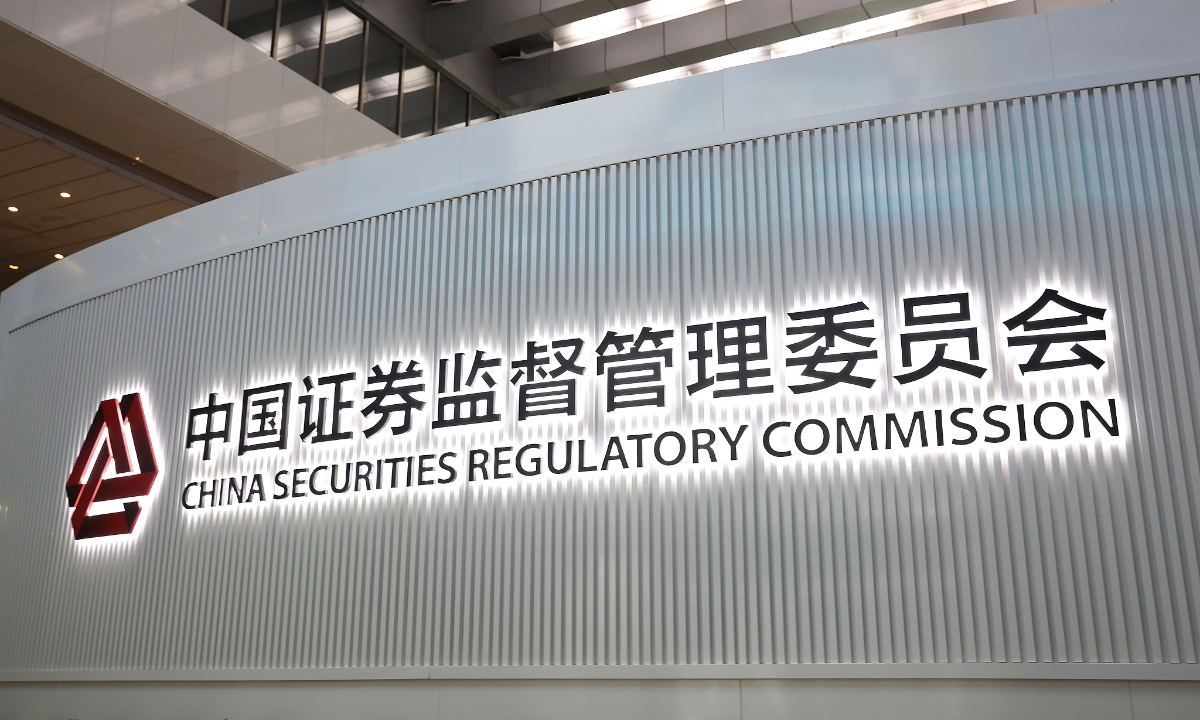
China Securities Regulatory Commission (CSRC) in Beijing Photo:VCG
China will continue to expand the opening of specific futures varieties and attract more overseas institutions to participate in the pricing of China's primary product futures varieties, a senior government official said on Thursday, in what experts viewed as a firm signal of China's determination to further open up its financial markets, which will provide new growth momentum for global market investors amid volatility on some overseas markets.
Fang Xinghai, deputy head of the China Securities Regulatory Commission (CSRC), said during the 20th Shanghai Derivatives Market Forum on Thursday that China will continue to expand the "width and depth" of the Chinese futures market's opening-up level, according to a report of Shanghai-based news portal jiemian.com.
According to Fang, China has already opened up 23 specific futures varieties to offshore investors, as well as 39 commodity futures option varieties to participants in the Qualified Foreign Institutional Investor (QFII) and RMB Qualified Foreign Institutional Investor (RQFII) programs.
"We will continue to expand the opening of specific futures varieties at a steady pace, expand the investment scope of QFII and RQFII, attract more overseas institutions to thoroughly participate in the pricing of China's primary products futures varieties, enhance the influence and representativeness of China's futures prices, as well as provide a more accurate price signal to industries and enterprises," Fang was quoted as saying.
This is the latest signal sent by Chinese officials that testifies China's determination to open up its economy, with a string of opening measures being launched in recent years, such as relaxing or even removing limits on foreign ownership of financial institutions in China, ranging from banks to securities.
Experts said that opening up the futures market is in line with China's long-term strategy and also fits the requirement of reforms in China's futures industry.
Chen Jia, a veteran macroeconomy observer, told the Global Times on Thursday that compared with banking, securities and insurance, the opening-up level and depth of reforms in China's futures market are still in an early stage, and the market's ability to serve the real economy needs to be strengthened.
"On the one hand, the high-level opening-up of the futures market will help Chinese market institutions deeply participate in the pricing mechanism of global bulk commodity markets, which safeguards supplies and stabilizes prices of China's strategic resources, such as carbon and lithium," Chen said, adding that on the other hand, it will play an important role in offsetting global energy and grain crises amid volatile international geopolitics.
"The orderly opening-up of China's futures market will provide new growth momentum for investors in the global market, which makes an immeasurable contribution to stabilizing the turbulent global financial market as a result of crises in the US including banking 'thunderstorms', a US economic hard landing and the outcome of the Federal Reserve's interest rate hikes," he noted.
Hong Yong, a research fellow with the Chinese Academy of International Trade and Economic Cooperation, said that overseas investors are enthusiastic about China's futures market, which has "a certain degree of international influence", along with China's opening-up policies, abundant trading methods and a mature regulatory system.
"With the further opening-up of China's futures market, it is expected that foreign investment in China's futures market will continue to increase, which will improve the operational efficiency and competitiveness of China's futures market," Hong said.
Meanwhile, experts cautioned that opening the futures market will carry a certain level of risks, while officials vowed that authorities will strengthen management of the sector.
Chen said that the futures market might amplify risks along with leveraged trading, which may lead to higher volatility than traditional markets.
Fang said that China will strengthen the supervision and monitoring of the primary product futures market, and crack down on illegal and irregular activities such as market manipulation.

